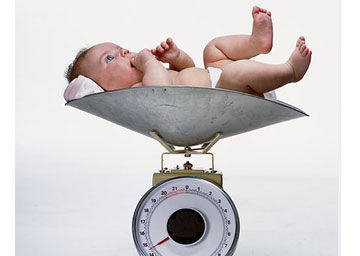双语:出生体重轻的人更容易得老年病
 出生体重轻的人更容易得老年病
出生体重轻的人更容易得老年病据英国《每日邮报》报道,科学家在血液中发现一种化学“指纹”或许能预测寿命,以及衰老速度。
这项发现有助于 医生在婴儿出生时进行简单的测验便可预知老年疾病,而且有助于研发新的老年病治疗手段,比如骨骼方面的问题和心脏病等。
科学家分析了6000多对双胞胎提供的血样,提取了22种与衰老相关的代谢物,即与新陈代谢相关的小分子。其中一种代谢物C-glyTrp,与多种身体特性相关,如肺功能、骨骼密度、血压以及胆固醇含量,而且还与出生体重密切相关。科学家比较双胞胎中C-glyTrp含量发现,C-glyTrp含量较高的,出生时体重较轻。
科学家认为C-glyTrp含量能够反映晚年衰老的速度。伦敦国王学院的蒂姆•斯波科特教授表示:“科学家早已证实,一个人的出生体重是他中晚年时健康状况的重要决定因素。出生体重轻的人更容易得老年病。”(编译:刘强)
A revolutionary new blood test could tell you how long you will live, and how quickly you will age。
Scientists have discovered a chemical ‘fingerprint’ in the blood that may provide clues to an infant's health and rate of ageing near the end of life。
The discovery raises the prospect of a simple test at birth that could help doctors stave off the ravages of disease in old age。
It could lead to the development of powerful new treatments for age related conditions such as bone problems and heart disease。
Scientists identified 22 metabolites, small molecules linked to metabolism, that may be useful indicators of how we can expect to grow old。
One in particular, linked to a range of traits including lung function, bone density, blood pressure and cholesterol levels, was singled out by the researchers。
It is also strongly associated with birth weight - itself a known determinant of healthy ageing。
Levels of this metabolite, C-glyTrp, could reflect accelerated ageing in later adulthood, the scientists believe。
Higher levels of the molecule were associated with lower weight at birth in comparisons between pairs of identical twins。
Since identical twins share the same genes, this suggests that levels of the metabolite are altered by nutrition or different conditions in the womb。
Study leader Professor Tim Spector, from King's College London, said: ‘Scientists have known for a long time that a person's weight at the time of birth is an important determinant of health in middle and old age, and that people with low birth weight are more susceptible to age related diseases。
‘So far the molecular mechanisms that link low birth weight to health or disease in old age had remained elusive, but this discovery has revealed one of the molecular pathways involved.’
Professor Spector's team analysed blood samples donated by more than 6,000 twins。
Scientists found 22 metabolites, small molecules linked to metabolism, that may be indicators of how we will age. Some are strongly linked to birth weight suggesting this can be an important factor in health later in life
The researchers identified 22 metabolites directly linked to chronological age, with higher concentrations in older than in younger people。
Further work showed that the gene influencing levels of C-glyTrp could be modified by epigenetics, a process whereby environmental factors switch genes on or off and alter their activity。
The epigenetic changes may influence metabolism during a person's lifetime, thereby affecting susceptibility to age-related diseases。
The findings are published today in the International Journal of Epidemiology。
Co-author Dr Ana Valdes, also from King's College London, said: ‘Human ageing is a process influenced by genetic, lifestyle and environmental factors, but genes only explain a part of the story。
‘Molecular changes that influence how we age over time are triggered by epigenetic changes. This study has for the first time used analysis of blood and epigenetic changes to identify a novel metabolite that has a link to birth weight and rate of ageing。
‘This unique metabolite, which is related to age and age-related diseases, was different in genetically identical twins that had very different weight at birth. This shows us that birth weight affects a molecular mechanism that alters this metabolite。
‘This may help us understand how lower nutrition in the womb alters molecular pathways that result in faster ageing and a higher risk of age-related diseases 50 years later。
'Understanding the molecular pathways involved in the ageing process could ultimately pave the way for future therapies to treat age-related conditions。
‘As these 22 metabolites linked to ageing are detectable in the blood, we can now predict actual age from a blood sample pretty accurately and in the future this can be refined to potentially identify
- 专家指导:生活中如何教孩子学英语?2013-07-11 11:33
- 专家指导:好家长如何教孩子学英语?2013-07-11 10:42
- 孩子学英语四大原则一个都不能少2013-07-03 14:31
- 适合孩子学英语的亲子游戏2013-07-02 14:37
- 用正确的心态对待孩子学英语2013-07-01 16:05
